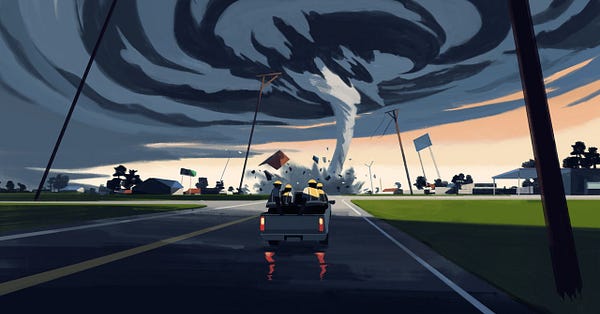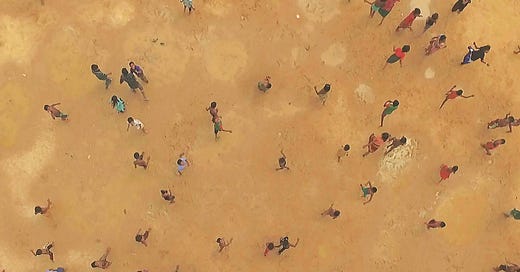#49 - on the disposition to migrate
And the birthright of growth and redefining home in the midst of rapid, global change
If you value what you read and would like to support my work, consider Buying Me A Coffee, leaving a heart/comment on this post below, or sharing this journal with another human. If you’re not a subscriber yet, join us!
THANK YOU, LOVE YOU.
The forests are on the move. This is the summary of a piece written by Chelsea Steinauer-Scudder and Jeremy Seifert in Emergence Magazine about The Great Tree Migration happening across Turtle Island. It turns out, it is not uncommon for trees to migrate when their environment is no longer stable for their growth and future kin, though it is typically imperceptible within a single human generation. Slowly, and through seed dispersion in the gust of winds and the scamper of animals, trees will relocate to places where they are more likely to succeed. For instance, over the last 14,600 years, spruce trees have moved south from the Canadian Territories down to Quebec and across Maine, when the Laurentide Ice Sheets began to melt. In this way, even trees are deferential to the birthright of survival, despite our perception of them as fully sturdy and steadfast beings.
So while tree migration is not new, the difference today is that rapid climate changes have introduced an onslaught of pests, invasive plants, fungal diseases, and architecture disrupting pathways on the land, which is making it tough for trees to move effectively. ‘Forests often cannot move fast enough to account for changing environmental factors,’ Steinaur-Scudder and Seifert write. Currently, 86 tree species, are on the move, like the sugar maple who is unsure if there will be enough snow to insulate her roots, or the red spruce being pushed by bleeding marshes from rising sea levels. Given the disturbance in their natural rhythm of migration, they will not survive without human support and assistance.
At the same time, thousands of migrants have crowded the border between Belarus and Poland, most of whom are seeking asylum from Afghanistan after the country erupted when the Taliban took over state power in August after US’s unceremonious withdrawal. Earlier this week, Polish troops were deployed when hundreds of migrants stampeded the checkpoint. Tear gas and water cannons were fired to keep migrants from ‘invading’ and ‘threatening’ Polish culture and sovereignty; disrupting a natural rhythm of human flow, who like trees, will leave untenable circumstances to a place where they are more likely to survive and succeed. The fear of the ‘migrant’ is effectively the belief that we are all inherently colonialists, driven to occupy and dominate, rather than share and uplift.
Out here in the west, migration is also happening, fuelled by a nation-wide housing crisis, the American drive for economic opportunity and tax breaks, remote work, digital nomadism, the desire for year-round access to nature and ultimately, the privilege of a passport that facilitates unencumbered movement. The exodus from San Francisco and San Jose (about 23% and 17%, compared to 3% across the US) to Texas (or the Texodus) or smaller cities in California was considered a major shift, and largely driven by what researcher, Chris Salviati coined as the ‘untethered class’ - people with no children, who rent their home, and are either single or have a spouse with job flexibility.
Tech companies, including Apple, Facebook and Telsa announced opening campuses and headquarters in Texas over the last year to take advantage of the lower cost of living and business-friendly tax incentives that ultimately broke the dam on migration, particularly to Austin. In the New York Times article, Will Real Estate Ever Be Normal Again, reporter Francesca Mari deconstructs the Austin housing market, where prices have increased by 35% (compared to a national average of ~25%), houses routinely receive 70-90 offers, and the game is namely about speculation and accumulation. A similar trend is observable in Ontario, where I live, which had record-breaking migration out of the province in the middle of 2021 (~37,000 people), and 72,000 people over 2020, moving to other regions in the country. In Toronto alone, ~50,000 moved out of the city into surrounding areas over 2020 due to the high cost of living and the ability to work remotely. However, as human flow goes, much of this loss is being replaced by international migration into the city.
Earlier this year, C and I gave up our $3,000/month apartment after I left my job and decided to live transiently for awhile. We spent some time at my parents in Markham, rented a cottage in the countryside in Quebec, and most recently we experimented with co-living with another couple on Bloor West - the prelude to the lefty dream of living in a commune in the forest. Right now, we are subletting a friend’s place for a month who is traveling in Europe, while moonlighting looking at condos we can barely afford, because I guess that is what you are suppose to do, while I push and prod against the option of also leaving Toronto.
Through the year, C and I have struggled to find a shared definition of home within a prolonged pandemic and cycles of public grief when the graves of thousands of children murdered in residential schools across Canada were identified, when encampments set up in parks by people without shelter were violently mauled by the city and when people lost their homes in the fires that blazed across Northern Ontario and British Columbia. Altogether, it has made this place at times feel untenable to live and thrive in. We were intent on moving to the countryside, but after losing a few bids on properties, the market subsequently moving upwards, the concern of a loss of community, and impossibly low real estate inventory, it has become a difficult vision to realize.
The romance of homeownership has sullen as we collectively continue to participate in yet another unsustainable market, due to a lack of perceived power and meaningful alternatives. We talk about the ‘market crashing’ flippantly, as if we are inevitably go-karting towards it for the fun, the adrenaline, the heck of it, unable to consider what that actually might mean on the other side. Buying multiple properties as an investment and starting Airbnb hustles is seen as ‘smart’, despite the impact on the rental market. And the economics of today’s market can often mean that home ownership is not possible without the conception of a personal sacrifice in one’s ‘ideal’ profession, creative aspirations and work lifestyle; needing a stable income at a stable company to support lifetime mortgages and health insurance.
While looking at a condo last week, my real estate agent, who I genuinely really like, mentioned that he has a property in Scarborough sitting vacant until the price goes up because renting is too much of a hassle. ‘I am part of the the problem,’ he laughed; an idiom that we’ve become too comfortable with. I know we don’t know what else to do. I also don’t know what else to do. It appears that the same awkwardness of being the first person to start eating at a potluck seems to also exist in the pursuit of living differently, radically. We are roadblocked into a system, like trees unable to migrate alone, and it is increasingly uncomfortable.
This liminal space has led me to wonder if in the midst of climate change and global migration, across living species, in every direction and under every circumstance:
how we might collectively redefine home?
how might we disentangle survival and sacrifice to honour the birthright of thriving?
how we might all become migrants in our lifetime?
how might we identify as stewards versus owners to facilitate the natural flow of humans, of living species, across lands and borders?
how might we recognize the migrant as instrumental to a complex knowing of the world, and therefore, a richer evolution of who we are?
To me, home has simply become that which is warm and cozy. It is ever-evolving, and I have found it equally in the presence of people with whom I let it all be real, inside the arms of a worn sweatshirt, and on the tracks of a familiar walk. It is warm lighting, fetal position and relaxed jaw muscles. It is turning on the seat heater while having a long, asynchronous conversation in the car. It is walking to a friend’s on Sunday evening to watch our show. And it is sharing the load of cooking with neighbours to relieve time for all of us. It is less place, and more the culture and meaning of a space.
In the series, Artists in Presidents: Transmissions to Power, access ecologist, community organizer and teacher, Kevin Gotkin, calls for a ‘cozy politics.’ He invites us to imagine a productive person as someone who is cozy, rather than someone whose discomfort and constant mobility proves their tenacity, grit and good work. He suggests that those who live in endemic states of vulnerability -disabled, chronically ill and poor racialized communities - are experts in cultivating a coziness and care outside of financial logic - because it is the only way to survive.
Migrants, whether they are trees, animals, humans, leave their environments and homes to seek cozier landings. We are equally wired for stability, as we are for freedom and growth, and not honouring both is simply not understanding the living spirit. If environments, cities, families, relationships, neighbourhoods, workplaces fail to offer both, to create a sense of coziness, the most natural thing we know how to do is flee.
Much love,
Hima
#HimaLive
Artist Care Series | Newest Magazine | November 24 @ 6pm
I will be going live with Dr. Dori Tunstall, the Dean of OCAD University to talk collective care within the Canadian arts community. Join us for this ongoing series.
How to Plant Futures in Your Prophetic Body | Workshop | December 8 @ 6pm
I am holding a workshop and space for communal dreaming, liberation work and embodiment (!) to centre us in our next cycle. Hold the date and stay tuned for registration next week.
#ThisWeekInTweets























